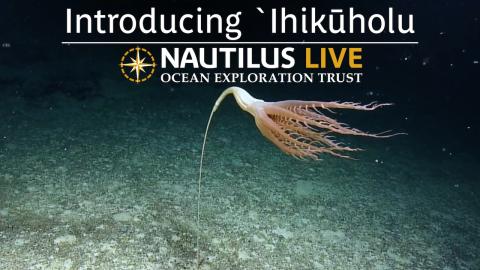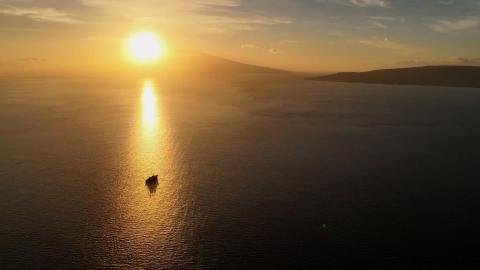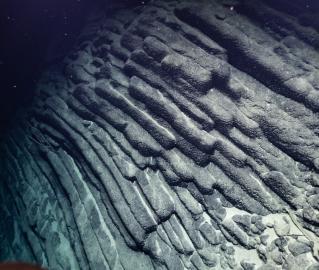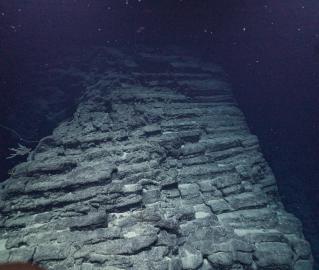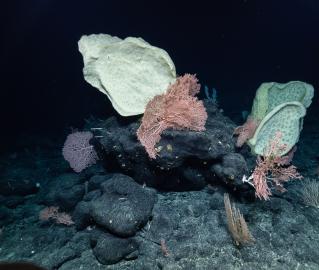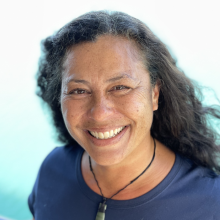
Hōkūokahalelani Pihana
Tell us about your work/research. What kinds of things do you do?
Aloha Mai Kākou. ʻO Hōkūokahalelani (Hōkū) Pihana au. He mākuahine au. He wahine Hawaiʻi au. He wahine waʻa au. E hana au i nā waʻa no ka mālama ana i ka moana a me nā kānaka ʻōiwi o Hawaiʻi Nei.
Aloha Mai. My name is Hōkūokahalelani (Hōkū) Pihana. I am a mother. I am a Native Hawaiian. I am a canoe woman. I use canoes to care for our oceans and the people of Hawaiʻi. I created the Nā Waʻa Mauō marine stewardship program in 2015 to create a more holistic and less invasive way to study our oceans that blends institutional and indigenous sciences. Our program studies the ocean through a Native Hawaiian worldview to better understand the health and wellness of our oceans and communities. Our students examine traditional noiʻi (text) such as Native Hawaiian moʻolelo (stories), oli (chants), wahi pana (place names) and ʻōlelo noʻeau (proverbs) to identify environmental changes over time and understand the historical significance of their field site. They also use the mechanics if institutional science to gather information about the marine environment through water properties analysis, primary productivity sampling, and benthic survey mapping. Collectively, the work that we do is intended to perpetuate the practices of our ancestors to care for our oceans and to strengthen the emotional, social, and physical well being of our next generation of marine stewards.
What sparked your initial interest in your career?
My connection to the ocean through my Papa, Lucky Pihana, has inspired me to pursue a career in ocean stewardship. As a child, I was always in the waʻa (canoe) with my Dad and when he passed, I stayed connected to waʻa and the ocean to be close to him. I chose to pursue a career in ocean science and education to perpetuate the practices of my family and sustain the relationship I have with my Papa.
Who influenced you or encouraged you the most?
My mom, Nancy McMahon, is my ʻāina, my foundation. She always supported and believed in me even when I doubted myself and my abilities. As a single mom, she worked hard to support the two of us and was always driven to provide me with a good life. Through all of my successes and failures, she loved me unconditionally and that love inspired me to pursue higher education and attain a career in marine science.
What element of your work/study do you think is the most fascinating?
The most fascinating part of my work is what we experience on the ocean in a waʻa as we are working together. The movement of waʻa always attracts marine life and as we are conducting our environmental observations and gathering our data we often encounter naiʻa (dolphins) and honu (sea turtles) who curiously come around the canoe or see malolo (flying fish) and hīhīmanu (sting rays) jumping or playing at the surface of the water just in front of our waʻa. It feels as if they know that the waʻa is ancestral.
What other jobs led you to your current career?
I think that my diverse experiences and work background has well prepared me for the position I hold now as the Executive Director of the Nā Waʻa Mauō Marine Stewardship Program. Tending bar and waiting tables taught me how to be social and positively engage with others. Voyaging open oceans in single-hull canoes has provided me with the skills needed to work safely in the ocean using diverse tools. And finally, teaching Oceanography at the university level provided me with the experience needed to develop a program that supports all aspects of student growth; academic, emotional, and physical. Collectively, these experiences and being a mom have led me to the career I have today using waʻa as a vehicle to care for our oceans.
What are your degrees and certifications?
Bachelors of Arts in Marine Science - University of Hawaiʻi at Hilo 2013; Master of Science Tropical Conservation Biology and Environmental Science (TCBES) - University of Hawaiʻi at Hilo 2017.
What are your hobbies?
I love being in the waʻa and on the ocean with my family. I love spending time with my kid's surfing, swimming, and paddling canoe. I enjoy dancing hula and spending time with my kids and dogs.
What advice would you give someone who wants to have a career like yours?
I always tell myself and kids "Do it for the love of...because then it will be effortless" like when we find the blend in paddling canoe that enables us to paddle for vast distances. When you love what you do and it inspires you to do great things for yourself, your family, and your community your work becomes fulfilling and valued beyond the monetary because now it feeds you, enriches you, and inspires you. E holomua me ke aloha.
How did you get involved with the Ocean Exploration Trust?
My relationship with Ocean Exploration Trust began during the development of the 2021 & 2022 Papahānaumokuākea Marine National Monument expeditions. As a member of the Native Hawaiian Cultural Working Group and Chair of the Nomenclature sub-committee, I was able to be a part of the expedition naming process. The creation of these names evoked an oli (Native Hawaiian chant) that can now be used by all of us as we voyage in Papahānaumookuākea.
Luʻu a ea a hiki i ke kai lipolipo
Luʻu a ea a hiki i ka papakū e
Luʻu a ea a hiki i ke kualono kai
Luʻu a ea a hiki i ke kumu e
Expeditions
Hōkūokahalelani participated in the following Ocean Exploration Trust expeditions:
